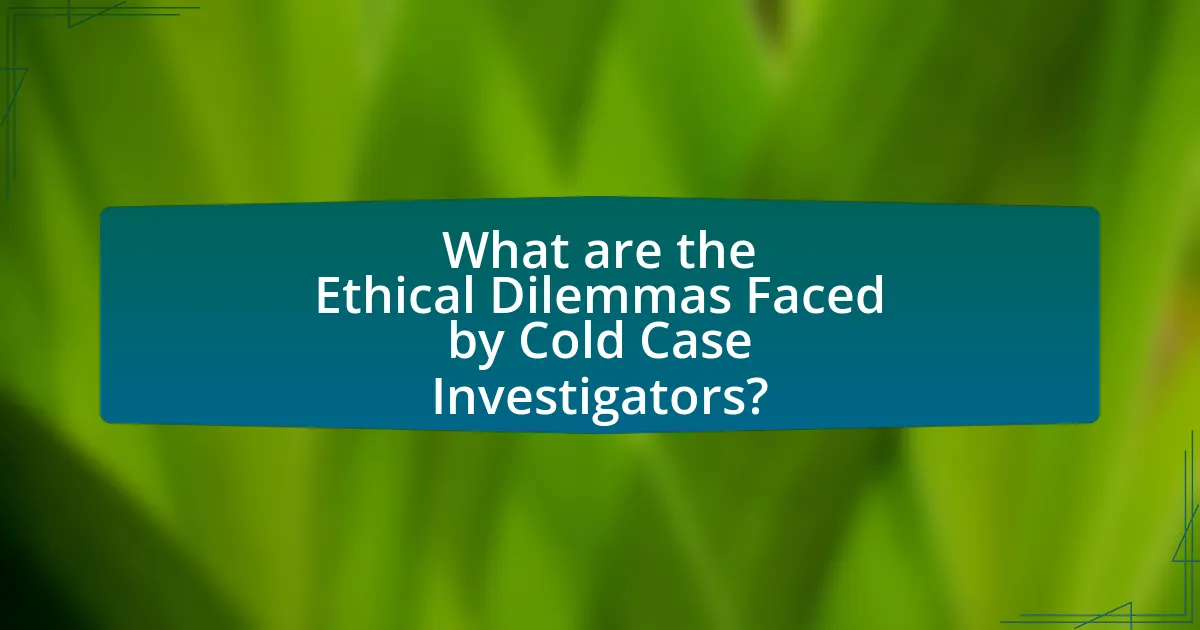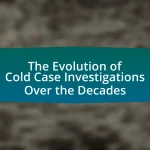Cold case investigators encounter numerous ethical dilemmas that challenge their pursuit of justice while respecting the rights of individuals involved. Key issues include the risk of wrongful accusations, the emotional impact on victims’ families, and the ethical implications of using modern forensic techniques. Investigators must balance legal obligations with moral considerations, ensuring that their actions do not compromise the integrity of the investigation or re-traumatize those affected. The article explores the specific ethical challenges faced, the importance of maintaining public trust, and strategies for upholding ethical standards throughout the investigative process.

What are the Ethical Dilemmas Faced by Cold Case Investigators?
Cold case investigators face several ethical dilemmas, primarily concerning the balance between seeking justice and respecting the rights of individuals involved. These dilemmas include the potential for wrongful accusations, as reopening cases may lead to new suspects based on incomplete or misinterpreted evidence. Additionally, investigators must navigate the emotional impact on victims’ families, who may have moved on or found closure, and the ethical implications of re-traumatizing them by revisiting painful memories. Furthermore, the use of modern forensic techniques raises questions about consent and the handling of sensitive information, particularly when it involves DNA evidence that may implicate innocent parties. These ethical challenges require cold case investigators to carefully consider their actions and the broader implications of their work on individuals and society.
How do ethical dilemmas impact the decision-making process in cold case investigations?
Ethical dilemmas significantly influence the decision-making process in cold case investigations by creating conflicts between legal obligations and moral considerations. Investigators often face situations where they must balance the pursuit of justice with the potential for wrongful accusations or the impact on victims’ families. For instance, the decision to reopen a case may hinge on the ethical implications of using new technology, such as DNA testing, which could exonerate a suspect or implicate an innocent person. Research indicates that ethical frameworks guide investigators in navigating these complexities, emphasizing the importance of integrity and accountability in their choices. This ethical guidance is crucial, as it helps maintain public trust in law enforcement while ensuring that investigations are conducted fairly and justly.
What specific ethical challenges arise during the investigation of cold cases?
During the investigation of cold cases, specific ethical challenges include the potential for re-traumatizing victims’ families, the risk of misusing forensic evidence, and the ethical obligation to ensure that new leads do not compromise the integrity of the original investigation. Re-traumatization occurs when families are contacted for new information, which can reopen emotional wounds. Misuse of forensic evidence can arise if investigators prioritize solving the case over adhering to proper protocols, potentially leading to wrongful accusations. Additionally, investigators must balance the pursuit of justice with the need to respect the privacy and dignity of all individuals involved, ensuring that their actions do not exploit the situation for personal or professional gain. These challenges highlight the complex ethical landscape that cold case investigators navigate while seeking resolution for unresolved crimes.
How do investigators prioritize ethical considerations over case resolution?
Investigators prioritize ethical considerations over case resolution by adhering to established ethical guidelines and legal standards that govern their conduct. This prioritization ensures that the rights of individuals involved, including victims and suspects, are respected and protected throughout the investigative process. For instance, investigators often refrain from using coercive interrogation techniques, which can lead to false confessions and wrongful convictions, thereby upholding the integrity of the justice system. Additionally, ethical training and oversight mechanisms are implemented within law enforcement agencies to reinforce the importance of ethical decision-making, ensuring that case resolution does not come at the expense of justice or moral responsibility.
Why is ethical integrity crucial for cold case investigators?
Ethical integrity is crucial for cold case investigators because it ensures the credibility and reliability of the investigative process. When investigators maintain ethical standards, they uphold the trust of the public and the families of victims, which is essential for gathering information and cooperation from witnesses. Moreover, ethical integrity helps prevent misconduct, such as the mishandling of evidence or coercion of suspects, which can lead to wrongful convictions or the dismissal of cases. Research indicates that maintaining ethical practices in law enforcement leads to more effective investigations and better community relations, as seen in studies conducted by the International Association of Chiefs of Police, which emphasize the importance of ethics in fostering public trust and effective policing.
What role does public trust play in the ethical responsibilities of investigators?
Public trust is essential in shaping the ethical responsibilities of investigators, as it directly influences the legitimacy and effectiveness of their work. Investigators are tasked with upholding the law and ensuring justice, which requires the confidence of the community they serve. When public trust is strong, it fosters cooperation and transparency, enabling investigators to gather crucial information and support from the community. Conversely, a lack of public trust can hinder investigations, leading to skepticism about the integrity of the process and the outcomes. Research indicates that communities with higher levels of trust in law enforcement report greater willingness to assist in investigations, thereby enhancing the overall efficacy of the investigative process.
How can ethical breaches affect the outcomes of cold case investigations?
Ethical breaches can significantly hinder the outcomes of cold case investigations by compromising the integrity of evidence and eroding public trust. When investigators engage in unethical practices, such as fabricating evidence or coercing witnesses, the reliability of the investigation is undermined, leading to potential wrongful convictions or the dismissal of valid leads. For instance, a study by the National Institute of Justice highlights that ethical lapses can result in the mishandling of evidence, which directly impacts the ability to solve cases. Furthermore, public confidence in law enforcement diminishes when ethical standards are not upheld, making community cooperation less likely, which is often crucial for gathering new information in cold cases.
What are the common ethical conflicts encountered in cold case investigations?
Common ethical conflicts encountered in cold case investigations include the potential for bias in re-evaluating evidence, the handling of sensitive information, and the impact of public pressure on investigative decisions. Investigators may face bias when reassessing evidence due to preconceived notions about the case or individuals involved, which can compromise objectivity. Additionally, the management of sensitive information, particularly regarding victims’ families and their privacy, raises ethical concerns about transparency versus confidentiality. Public pressure can also lead investigators to prioritize solving cases for media attention rather than focusing on thorough and impartial investigations, potentially undermining the integrity of the process. These conflicts highlight the complex ethical landscape that cold case investigators navigate while seeking justice.
How do investigators handle conflicts between personal beliefs and professional duties?
Investigators handle conflicts between personal beliefs and professional duties by adhering to established ethical guidelines and protocols that prioritize objectivity and impartiality. They recognize that personal beliefs can influence decision-making, so they often seek supervision or consultation from peers to ensure that their actions remain aligned with professional standards. For instance, the International Association of Chiefs of Police emphasizes the importance of maintaining integrity and fairness in investigations, which helps mitigate the impact of personal biases. Additionally, investigators may engage in ongoing training to reinforce their commitment to ethical practices, ensuring that their personal views do not compromise the integrity of their work.
What are the implications of using new technologies in cold case investigations?
The implications of using new technologies in cold case investigations include enhanced investigative capabilities, improved evidence analysis, and potential ethical concerns regarding privacy and consent. New technologies, such as DNA analysis, digital forensics, and artificial intelligence, allow investigators to re-examine old evidence with greater precision, leading to higher rates of case resolution. For instance, advancements in DNA sequencing have resulted in the successful identification of suspects in cases that were previously unsolvable, as demonstrated by the use of familial DNA searches in cold cases, which have led to arrests in several high-profile investigations. However, these technologies also raise ethical dilemmas, particularly concerning the collection and use of genetic data, which can infringe on individual privacy rights and lead to potential misuse of information. The balance between leveraging technological advancements for justice and maintaining ethical standards is a critical consideration for cold case investigators.
How do cold case investigators navigate the balance between justice and ethics?
Cold case investigators navigate the balance between justice and ethics by adhering to legal standards while ensuring that their methods respect the rights of individuals involved. They prioritize the pursuit of truth and accountability, often employing advanced forensic techniques and re-examining evidence to uncover new leads without compromising ethical guidelines. For instance, the use of DNA evidence must comply with privacy laws and ethical considerations regarding consent. This careful approach is essential, as it not only seeks to bring closure to victims’ families but also upholds the integrity of the judicial process, ensuring that any new findings can withstand legal scrutiny.
What strategies can cold case investigators employ to maintain ethical standards?
Cold case investigators can maintain ethical standards by adhering to established protocols, ensuring transparency, and engaging in continuous training. Following established protocols, such as those outlined by the International Association of Chiefs of Police, helps investigators avoid biases and ensures that all evidence is handled consistently. Transparency in the investigative process, including open communication with victims’ families and the public, fosters trust and accountability. Continuous training on ethical practices and legal standards, as recommended by organizations like the National Institute of Justice, equips investigators with the knowledge to navigate complex ethical dilemmas effectively.
How can training and guidelines help in addressing ethical dilemmas?
Training and guidelines can significantly aid in addressing ethical dilemmas by providing investigators with a structured framework for decision-making. This framework helps cold case investigators navigate complex situations by outlining ethical principles and best practices relevant to their work. For instance, training programs often include case studies that illustrate potential ethical conflicts, enabling investigators to recognize and analyze similar dilemmas they may encounter. Research indicates that organizations that implement comprehensive ethics training see a reduction in unethical behavior, as employees are better equipped to identify and resolve ethical issues (Kaptein, 2011, “The Effect of Ethics Training on Ethical Behavior”). Thus, effective training and clear guidelines empower cold case investigators to make informed, ethical decisions in challenging circumstances.
What role does peer support play in ethical decision-making for investigators?
Peer support significantly enhances ethical decision-making for investigators by providing a collaborative environment where individuals can discuss dilemmas and share perspectives. This collaborative dialogue fosters a deeper understanding of ethical standards and encourages accountability among peers. Research indicates that investigators who engage in peer support networks are more likely to navigate complex ethical situations effectively, as they benefit from diverse viewpoints and shared experiences, which can lead to more informed and balanced decisions.
What best practices can cold case investigators adopt to address ethical dilemmas?
Cold case investigators can adopt best practices such as maintaining transparency, ensuring informed consent, and adhering to established protocols to address ethical dilemmas. Transparency involves openly communicating with victims’ families about the investigative process and potential outcomes, which fosters trust and accountability. Informed consent is crucial when dealing with sensitive information or re-interviewing witnesses, ensuring that individuals understand the implications of their participation. Adhering to established protocols, such as those outlined by the International Association of Chiefs of Police, helps investigators navigate ethical challenges systematically, ensuring that their actions align with legal and moral standards. These practices are essential for upholding the integrity of the investigation and respecting the rights of all parties involved.

